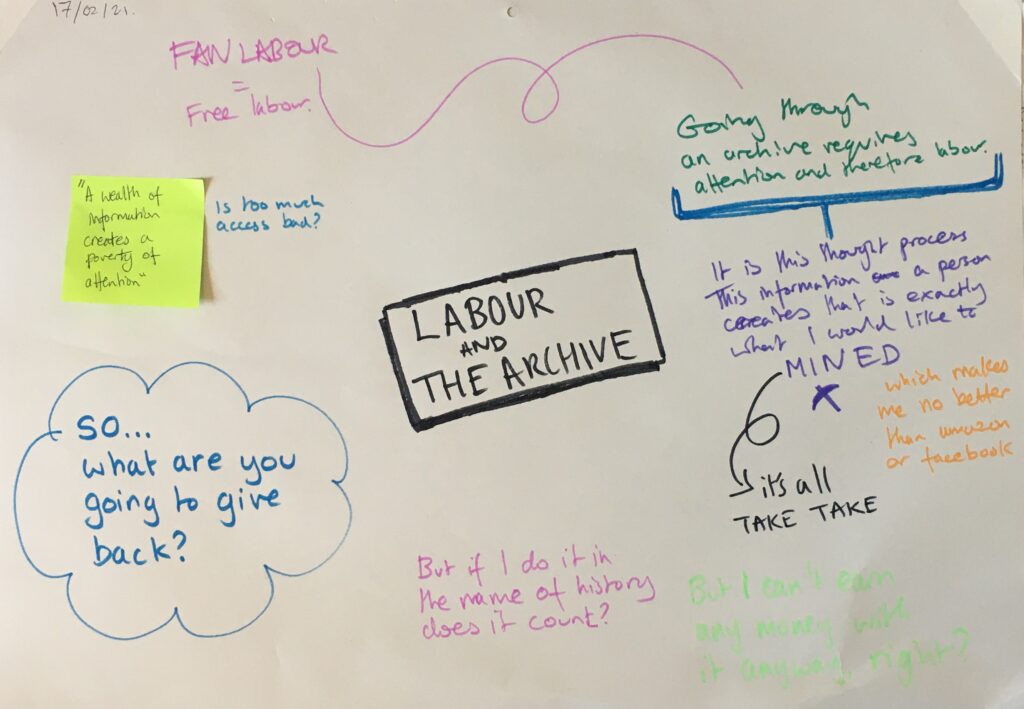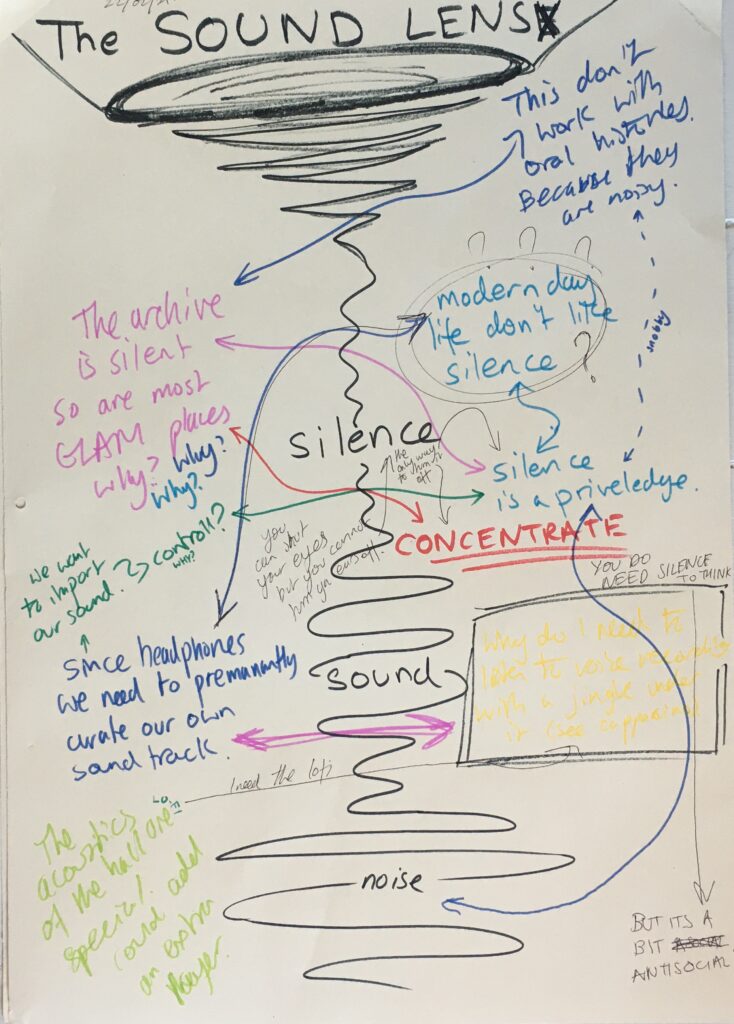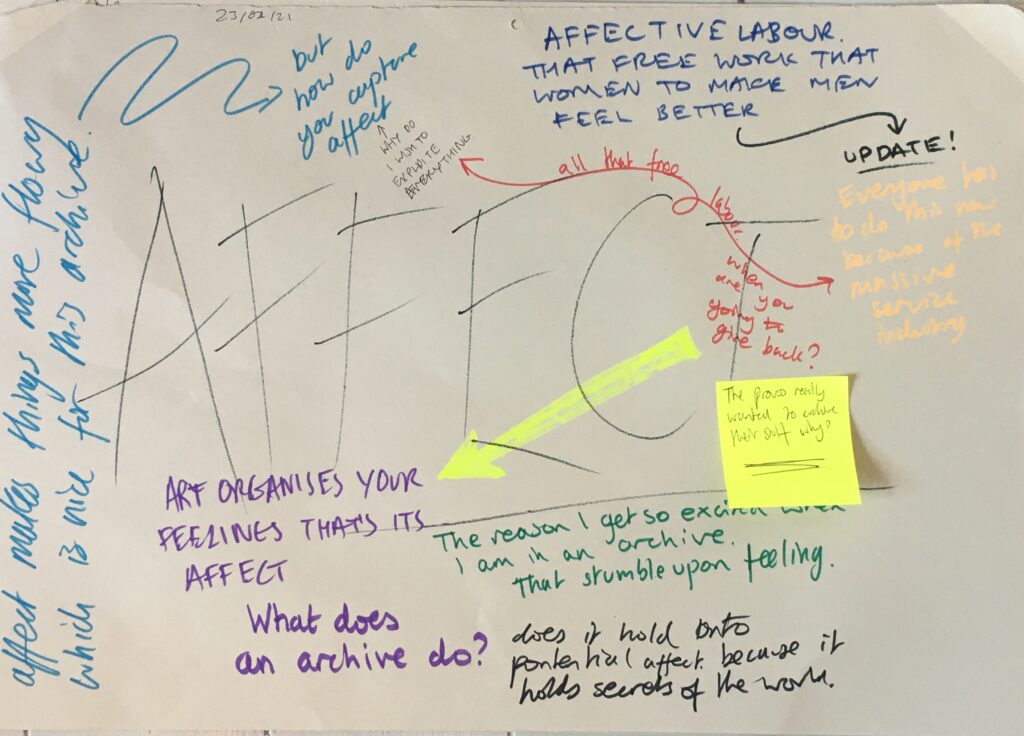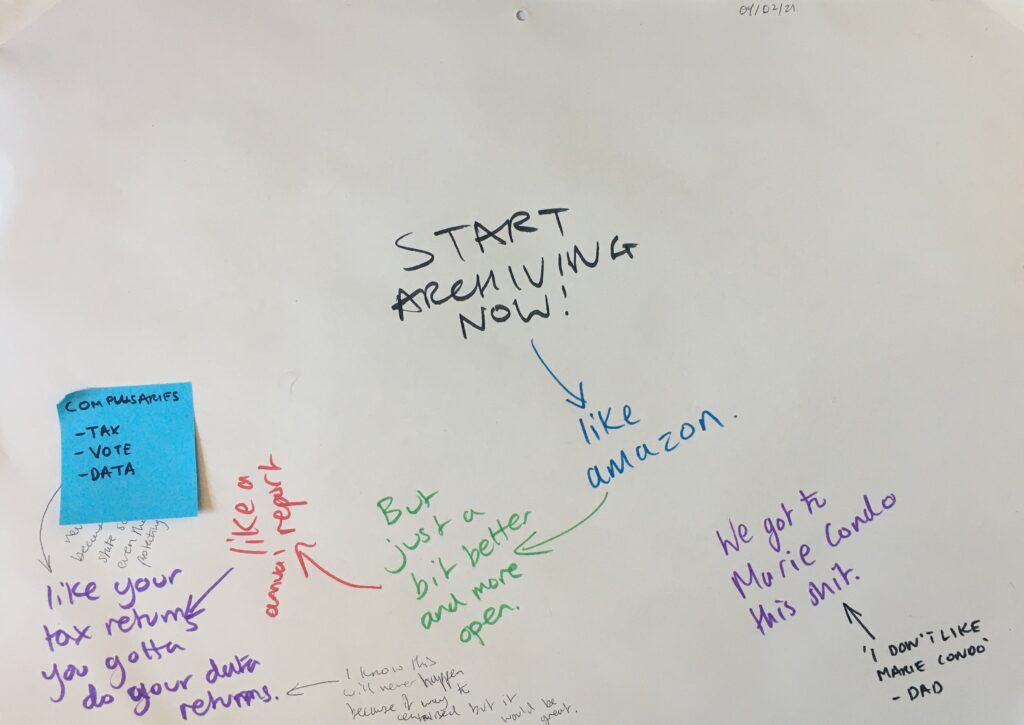A brainstorm document about an alternative GLAM space. It was interactive but that made it too big to upload.
Tag Archives: affect
OHD_BLG_0066 An Archival Impulse
by Hal Foster
turn “excavation sites” into “construction sites”
No Ghost Just a Shell
This is why I want to work with some of the art students because you can get some of this lovely weirdness when you work in that space. I just think there is great benefit in looking at how artists approach archives. Do I think that this artwork is archival? Well the ‘shell’ AnnLee (the manga character) is indeed an archival source but the majority of the piece is artists building on this archival source. So the artwork uses the archive and builds the archive AKA makes the excavation site into a construction site. There is all sorts of interesting things happening around the copyright of this piece. First an artist buys the copyright then invites others to do what they want with it and then finally they block anyone using AnnLee.
The idea of AnnLee and No ghost just a shell got me thinking again about this idea of something living in the archive, a ghost, a shell, a figure; something that people can project onto, something that embodies their need for a story. Anansi-esque, forever changing with the times.
Which is why I say…
Kill originality its all about collaboration now.
The story of a single narrative, a lone genius, an isolated idea is silly, because that is not how the world works. There is not one story that can represent a large group of people. A lone genius is most likely someone with an extensive network where they are able to exchange ideas. An eureka moment is often the result of many smaller ideas coming together. There is no such thing as an original idea and all artists steal. So maybe it is a good idea to stop obsessing over this idea of originality because all it does it put people with great ideas against each other instead of getting them to collaborate. Collaboration is more sustainable. Time would have change AnnLee and she would have reflected the world as it progressed and different people manipulated her. She could have lived on forever. Allowing things to change through collaboration instead of preserving and protecting an idea will allow the piece to support society while at the same time keeping its archived versions as windows to he past. This seems a more favourable than it becoming an artwork that needs to have a plaque added to it that says something along the lines of “by the way this dude was a massive misogynist”.
Moving on…
Vandalism as AFFECT
Trying to capture affect is very difficult/probably impossible. But in the written piece Foster mentions the spontaneous creation of the Diana memorial in Paris.

This got me thinking about how this spontaneous shrine and other types of vandalism or sudden outbursts of marking is maybe the closest you could get to capturing affect. Think the tearing down of the Berlin wall or the Edward Colton statue in Bristol. Pure in the moment emotion.

OHD_BLG_0075 Texts, Images and Sounds Seminars Summary
What follows is a summary of the various seminars that I took presented by Ian Biddle from Newcastle University. Overall I enjoyed these seminars mostly because I had covered many of the topics during my time at Goldsmiths but now I understand it better.
Thinking Texts
Seminar
You can read many things as texts: buildings, art, music etc. The word text comes from the word to weave. A text therefore represents a complicated set of ideas woven together to create one idea.
There is a lot of snobbery and hierarchical thinking around text and the author. Author come from the word authority. However to say that the author has complete authority over a text is a very outdated idea. Everyone interprets and experiences texts in a different way. This is often due to the various elements that make up their background: gender, race, work, economical background etc. In addition to this snobbery around interpretation there is also the also now outdated belief that cultures that have no text, have not published, have no history. Which is a bit racist.
Visual Culture and the Cinema Mode of Production
Reading and Seminar
I wrote a summary in a blog post
Map

Noise Cultures Base/Bass Materialism
Seminar
Sound is married and dependant on technology. They way we experience sounds has developed in correlation with tech look at the invention of noise canceling headphones but also the noise of industry and cars that infiltrates our everyday surroundings. Because of advancements in speakers listening has become a contact sense. We can now feel the beat of the music move our bones to the rhythm.
There is a spectrum of sound where music is on one end and noise is on the other. Where sounds fall on this spectrum changes with time and whoever is listening.
How we perceive sound and our experience of it has changed dramatically over time. We now live in a world of lo-fi sound, a constant blurry noise where we cannot make out the specific sources. Before we live in hi-fi sound. Everything could be heard crystal clear because we did not have the rumble of the machines.
Our relationship with silence is also very strange. Sound proof housing in a city centre is extremely expensive. To have access to silence is a privilege. Yet we are also afraid of silence. We are constantly turning on music and TV. Most people cannot walk from A to B without having headphones in. I think we have a need to control our sound.
Slavonic Languages have different words for listening but I haven’t been able to find any examples.
‘Acousmatic Sound’ listening to a sound without know the source. Basically Greek philosophers would stand behind a curtain and speak in an effort to get the audience to concentrate better on what they were saying.
Map

The Affective Turn or the New Scholarship of the Senses
Seminar
Affect (psychology) = mood
Affect (philosophy) = the grammar of emotions
Affect labour = labour that is conducted in the service industry often considered feminine work
Affective computing = instead of the old input output model this type of computing is focused on interface
Feeling works on a very different logic. It’s the body of knowledge outside of the rational that controls emotions. It is in a sense a different world that we live in.
Affect. Complicated political thinking without attracting too much attention or a specific type of attention from a suppressive state. Think Provo and their ludike actions.
Art organises your feelings. It’s that ah! moment when you see a work of art that perfectly communicates a complex feelings.
Affect theory kills boundaries. Biddle’s tip if you are stuck throw some affect theory at it. It’s not political and it unpicks the logic of other theories.
Map

Memory and the Archive
Reading
This is an easier version of Derrida.
To make an archive is to repeat. It is a deeply nostalgic act with questionable productivity. “I just want to relive it”
The archive represents the now of whatever kind of power is being exercised anywhere at any place or time.
There is a feverish desire – a kind of sickness unto death – that Derrida indicated, for the archive: the fever not so much to enter it and use it, as to have it, or just for it to be there, in the first place.
Stedman, Dust
We have to have all the data.
And currently those who are in power (big tech) are also mining all the data for reasons no one is completely sure about less of all them.
Seminar
Archives are full of metaphors. From the architecture of the buildings that store them to the icons we use to store data on our laptop. This is common theme in new technologies. The first cars looks like carriages and the save button is a floppy disc. However some of these metaphors are more tailored to the elite, as in the elite are more likely to recognise this metaphor or the metaphor represents an elite version. Just look at the representation of the Jedi library in Star Wars it is nearly exactly the same as the library at Trinity College in Dublin. Why would Jedis need books?


The putting something in an archive is called archivisation. By archiving something you move it from the private into the public but not from the secret to the non-secret. That is because archives promise access but do not always give it. An archive can be compared to house arrest, the documents are not in prison but they are also not free.
Archives are particular anxious places. They worry a lot about the longevity of their collections and general rot. There is also the added anxiety that new forms of preservation leads to new forms of loss. When we were able to record sound we had to learn how to archive it. I cannot imagine the amount of loss that is created by the internet.
Quick warning here to not fetishise the archive please.
Map
